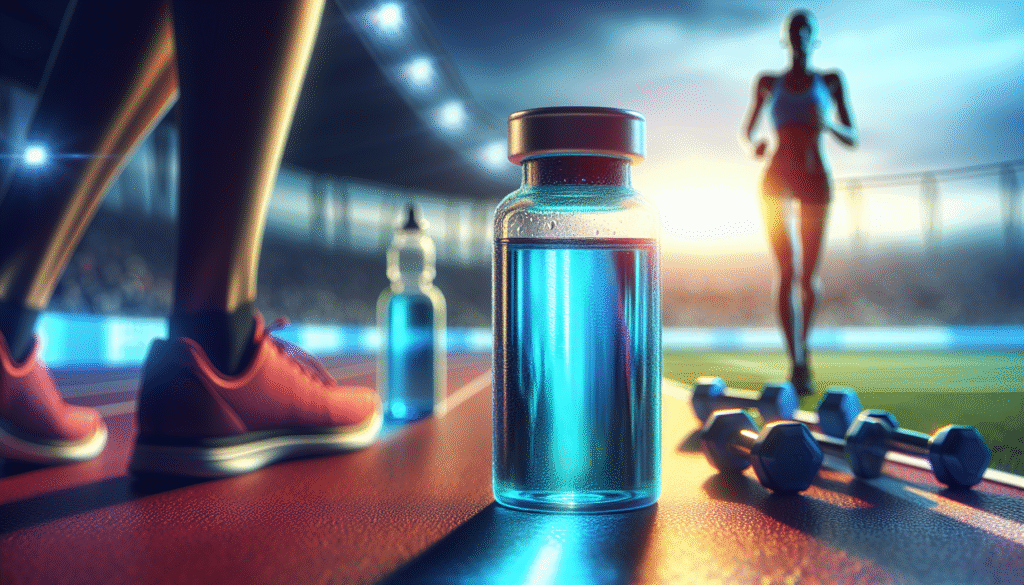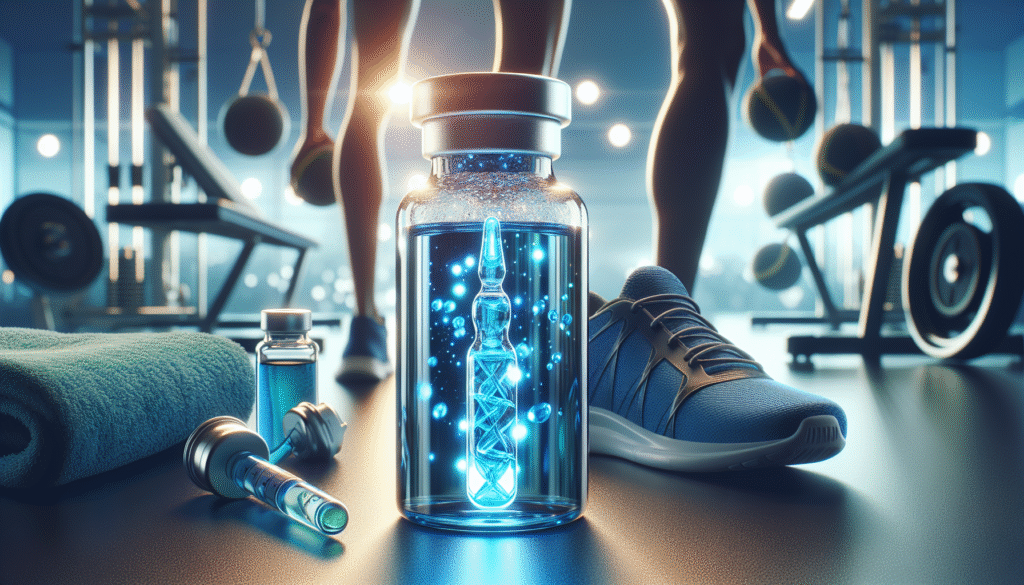
Have you ever considered how a compound traditionally used for medical purposes might enhance athletic performance? Methylene blue, a blue dye with a rich history in medicine, has emerged as a point of interest among athletes seeking to improve their performance and recovery times. This article delves into the potential benefits of methylene blue for athletes, examining its mechanisms of action, applications, and the science supporting its use.

Understanding Methylene Blue
Methylene blue was first synthesized in the 19th century and has been used in various medical applications, including treating methemoglobinemia, a condition where hemoglobin is unable to effectively carry oxygen. But its capabilities extend beyond mere treatment. In this section, you will gain insight into the properties of methylene blue and why it has garnered attention in the performance and recovery domains.
Chemical Composition and Properties
Methylene blue, or methylthioninium chloride, is a synthetic dye that exhibits unique chemical properties. As an aromatic compound with a molecular formula of C16H18ClN3S, it presents both blue coloration and fluorescence. Its solubility in water enhances its application in various environments, making it a versatile choice in both clinical and athletic settings.
Mechanism of Action
The primary mechanism of methylene blue lies in its ability to accept and donate electrons. This property is integral to its function as a redox agent. When introduced into the body, methylene blue enhances mitochondrial activity, increasing ATP production. ATP, or adenosine triphosphate, is vital for energy transfer in cells, which is particularly crucial for athletes engaging in high-intensity sports.
Benefits of Methylene Blue for Athletes
As you consider the advantages of integrating methylene blue into your training regimen, it’s vital to examine how it affects various aspects of performance and recovery. The following sections explore the nuanced benefits that methylene blue can offer.
Enhanced Aerobic Performance
One of the most promising benefits of methylene blue is its potential to improve aerobic performance. Increased mitochondrial activity means more efficient energy production, which is paramount for endurance athletes. By enhancing oxygen utilization, methylene blue may allow you to sustain high-intensity efforts for longer periods.
Improved Recovery Times
Post-exercise recovery is crucial for athletes aiming to maintain peak performance. Methylene blue has been suggested to reduce oxidative stress and inflammation, which can contribute to muscle soreness and delayed recovery. By helping to mitigate these symptoms, methylene blue allows you to return to training more swiftly and effectively.
Cognitive Function and Focus
Cognitive performance is often overlooked in discussions about athletic preparation. However, clarity of thought can significantly influence your performance during competitions. Methylene blue may enhance cognitive function by improving cerebral blood flow and oxygen uptake. This cognitive boost could lead to better decision-making and situational awareness in high-pressure environments.
Potential Applications in Different Sports
Methylene blue is not limited to specific athletic disciplines. Its broad-spectrum benefits make it applicable across various sports. Whether you are a marathon runner, cyclist, weightlifter, or team sports player, the potential advantages can vary depending on individual needs and goals.
Endurance Sports: Long-Distance Running and Cycling
For endurance athletes, methylene blue’s ability to enhance aerobic performance is crucial. It can improve your stamina by allowing you to perform at higher exertion levels without accumulating fatigue as quickly. This advantage can translate directly into better race times and improved training sessions.
Strength Sports: Weightlifting and Powerlifting
In strength sports, recovery is just as essential as performance. By reducing muscle soreness and oxidative stress associated with heavy lifting, methylene blue can enable quicker returns to the gym for subsequent training sessions. This effect supports consistent progression in strength goals.
Team Sports: Soccer, Basketball, and Field Sports
Team sports require not only physical prowess but also strategic thinking and teamwork. The cognitive enhancement provided by methylene blue could prove beneficial, allowing athletes like yourself to maintain focus throughout the game and make real-time tactical decisions.
Dosage and Administration
Understanding how to properly use methylene blue is crucial to reaping its benefits without experiencing potential side effects. In this section, you will discover the recommended dosages and how to incorporate it into your routine.
Recommended Dosages
The optimal dosage of methylene blue can vary based on several factors, including body weight, activity level, and individual tolerance. Research indicates that doses ranging from 0.5 to 4 milligrams per kilogram of body weight may be effective for desired outcomes. However, it is essential to start with a lower dosage to assess tolerance before gradually increasing it.
Administration Methods
Methylene blue can be administered in several forms, including oral tablets or solutions and intravenous injections. For athletes, oral administration is most common and convenient. However, precise dosage applications do depend on specific needs, so consulting with a healthcare provider is advisable prior to use.
Safety Considerations
Adopting any new substance into your regimen warrants careful consideration. Methylene blue is generally well-tolerated, but potential side effects and interactions with other medications do exist. This section provides crucial information on safety considerations.
Potential Side Effects
While methylene blue is largely considered safe, some individuals may experience side effects. These may include:
- Gastrointestinal Issues: Nausea or stomach upset can occur in some people.
- Skin Reactions: Temporary discoloration of urine or skin is possible, resulting in a blue or green tint.
- Interactions: Notably, methylene blue can interact with certain medications, particularly those affecting serotonin levels. If you are taking medications for conditions like depression or anxiety, it is essential to discuss methylene blue with your healthcare provider.
Individual Considerations
Personal factors such as medical history, allergies, and current health conditions ought to be taken into account. Pregnant or breastfeeding individuals should avoid using methylene blue unless under medical supervision.

The Scientific Evidence Behind Methylene Blue
Although the benefits of methylene blue seem promising, it is essential to examine the scientific research supporting these claims. In this section, you will find a summary of key studies and findings related to its use in athletic performance.
Studies on Performance Enhancement
Increasingly, studies are investigating the effects of methylene blue on physical performance. A notable study published in a peer-reviewed journal indicated that subjects administered methylene blue showed a marked improvement in aerobic capacity compared to a placebo group. This enhanced performance can be largely attributed to increased mitochondrial synthesis and efficiency.
Research on Recovery
Other studies have demonstrated the compound’s role in reducing oxidative stress. Research involving athletes subjected to rigorous training regimens showed that those using methylene blue reported reduced muscle soreness and quicker recovery times, suggesting that its antioxidant properties are beneficial in helping to mitigate training-induced damage.
Cognitive Enhancements in High-Pressure Situations
Research indicates a direct correlation between methylene blue use and increased cognitive function during fatigue-inducing tasks. In experiments, subjects displayed enhanced focus and decision-making capabilities after administration. These cognitive boosts can be particularly advantageous in competitive settings.
Conclusion
The application of methylene blue in enhancing athletic performance offers several intriguing benefits and warrants serious consideration for those seeking to elevate their game. With its potential to improve aerobic performance, expedite recovery, and enhance cognitive function, methylene blue can become a valuable tool in your athletic arsenal.
However, as with any supplement, it is essential to approach with caution. Individual responses can vary, so it is vital to consult with a healthcare professional before integrating methylene blue into your routine. As research continues to unfold, the possibilities for this compound are promising, possibly paving the way for future advancements in sports nutrition and performance enhancement.
Ultimately, the journey of understanding and potentially benefiting from methylene blue is one that can contribute significantly to athletic success. By taking the time to evaluate the science and make informed decisions, you position yourself not just as an athlete, but as a proactive participant in your own health and performance.
